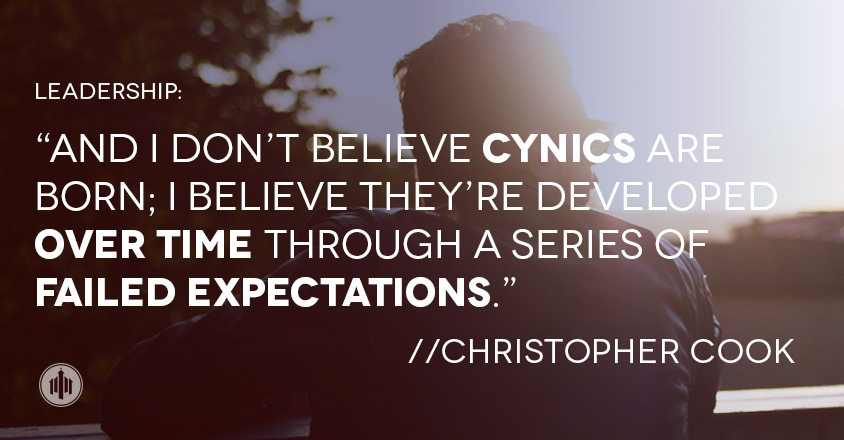Whether you like it or not, difficulties, disappointments, dashed expectations, and delays build the muscle of character necessary to maturely sustain the very thing (goal, desire, outcome) you’re pursuing. And the development of that muscle, along with the promise of a hope-filled future, is the very reason you must never give up on this journey called “life.” But one of the greatest impediments to personal growth (and Christian maturity) is cynicism. And I don’t believe cynics are born; I believe they’re developed over time through a series of failed expectations.
University of California-Irvine personality researcher Salvatore Maddi supports this notion: “the first seeds of cynicism are often planted when people put in effort to achieve a goal like snagging a promotion at work or raising a self-sufficient child—and then see their high hopes dashed. This disconnect between expectation and reality gives budding cynics a feeling of helplessness, prompting the emergence of a hallmark of the cynical personality: the sense that nothing anyone does in life really matters.”
It’s apathy.
It’s dejection.
And its root is a spirit of unbelief that begins when we lose perspective on circumstances (and life in general) following a series of failed expectations or disappointments.
Regain Perspective
You’re probably familiar with the saying, “he couldn’t see the forest for the tress.” The meaning of the statement is this: when you focus upon details (or an inconvenience, detour, or problem) too closely, you’ll lose perspective of the big picture; perspective that produces clarity, endurance, and engenders faith for unseen possibilities. A limited viewpoint limits your perspective and a limited perspective limits your possibilities. Worse yet, when it appears as though your possibilities are limited, it won’t be long before discouragement attempts to settle in, and that’s a recipe for retreat, regression, cynicism, and ultimately unbelief.
In my opinion, the key to preventing sinking into this low place requires that we manage our thought life before it frames our mindset and behavior. In Philippians chapter three, the Apostle Paul hits the nail on the head when it comes to perspective and forward momentum:
“I’m not saying that I have this all together, that I have it made. But I am well on my way, reaching out for Christ, who has so wondrously reached out for me. Friends, don’t get me wrong: by no means do I count myself an expert in all of this, but I’ve got my eye on the goal, where God is beckoning us onward—to Jesus. I’m off and running, and I’m not turning back. So let’s keep focused on that goal, those of us who want everything God has for us. If any of you have something else in mind, something less than total commitment, God will clear your blurred vision—you’ll see it yet! Now that we’re on the right track, let’s stay on it.” (Philippians 3:12-16, The Message)
Where you are today is not the end of the story. Don’t squander your potential by settling for mediocrity. Just because you’re facing a challenge or even significant disappointment doesn’t mean you should quit. Be a person whose character is strong and resilient. If you’re still breathing, there’s purpose yet for your life, and that’s one reason to never give up.
The Expectation Gap: When Disappointment Becomes Cynicism
Plans change, people don’t deliver on their promises, and unforeseen circumstances intersect great intentions. The common thread? Failed expectations. When expectation and outcome don’t line-up, disappointment is a natural reaction often exacerbated by a seed of offense (with another person or even with God).
However, disappointment (whether small or great) must be resolved, because unrelenting disappointment will make you heartsick, siphoning emotional and mental energy away from being creative and innovative towards productivity and fulfilling your purpose. Put simply, unresolved disappointment is a distraction that diverts your attention from the solution to endlessly ruminating upon the problem.
What does the progression of unresolved disappointment look like?
1.) Deferred Hope (Expectation is failed by actual outcome)
2.) Disappointment (Expressed emotion as a result of failed expectation)
3.) Despondency (The feeling of being defeated)
4.) Despair (Resolving that it’s pointless to continue to believe for a good future)
5.) Desperation & Cynicism
…that’s a road you and I cannot afford to travel upon.
Your heart is the engine room of your life, physically, emotionally, and spiritually. My friend, guard it diligently. Keep it free from lingering offenses and complications. Proverbs 4:23 (MSG) implores us without reservation: “Keep vigilant watch over your heart; that’s where life starts.”
Giving up and giving into a life of disappointment, despondency, and despair is a small, complicated life, and I don’t believe that’s who you are. On the other side of perseverance, finishing what you started, and staying in the game until the end is well built character modeled for your children, friends, and even your co-workers; character that will pay dividends into your own life.
There’s too little to gain by giving up and even more to lose. Though you don’t see how all the dots connect, it doesn’t mean they won’t. God’s hand is on your life whether you’re actively aware of it or not, and He hasn’t taken you this far to take you back. I promise.




 Creating a Healthy Worship Culture
Creating a Healthy Worship Culture